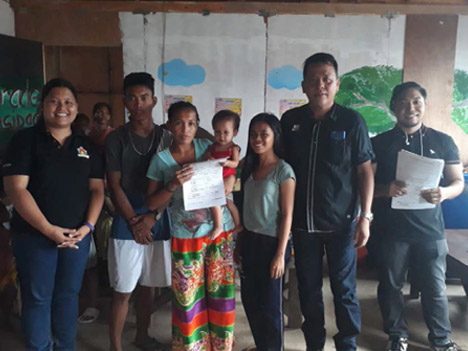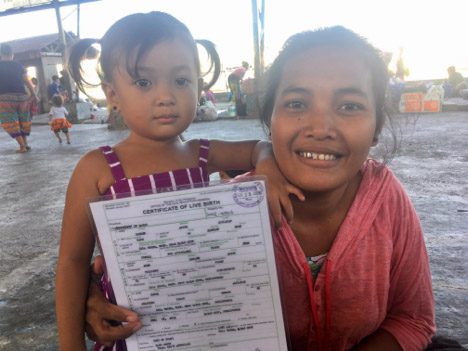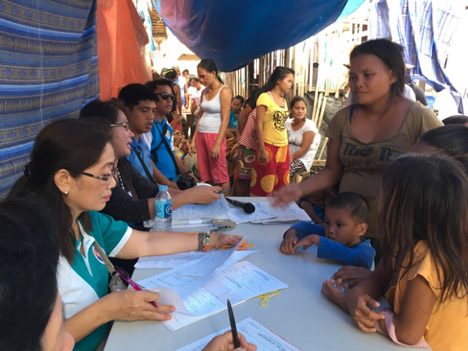SUMMARY
This is AI generated summarization, which may have errors. For context, always refer to the full article.

This is a feature from the Tambayan Center for Children’s Rights, Inc., an NGO based in Davao City.
DAVAO, Philippines – “Naay social worker na ni adto sa amo para tabangan mi sa 4Ps ug Philhealth pero di sila makatabang kay wala miy birth certificate. Kanunay nila pangita-on ni sa amoa,” said a Badjau mother while waiting for her name to be called by the Local Civil Registry during a mobile birth registration held on November 23, 2017, at Isla Verde, Davao City.
(There’s a social worker who wants to help us with government services, such as 4Ps and Philhealth, but they could not help us since we do not have birth certificates. They always look for that document.)
Badjaus, known as “Sea Gypsies,” have long established their own indigenous communities in Davao City to flee from the violence of the Southern seas of Mindanao. Despite their commanding existence, they remain to be among the most marginalized and discriminated ethnolinguistic group, often excluded and even undocumented.
A common issue they face is the difficulty of accessing birth certificates, a highly important document that enables one to be recognized of their identity as a human being who has a name, nationality, and most importantly, human rights.
The challenge of accessing birth certificates has led to a myriad of other issues such as difficulty in accessing social services, education, and formal jobs.
Mothers are usually hesitant to send their children to school because they do not have birth certificates. Salsiya and Amesia Karahan, both mothers, shared that having no birth certificates was hard.
“Lisod kay ma-u na ang pangitan-an. (It’s hard since that’s what they usually look for.)” Salsiya, who had her first child at 13, worries because even if 3 of her children already go to school, the administration still asks for their birth certificates. Others share that some schools would not accept their children because they are not able to provide the document.
Other Badjau mothers claimed that even public hospitals frequented by Badjaus would sometimes not clear their sick children if they are unable to present a birth certificate. Some of them share that the public hospitals sometimes don’t provide medicine if they could not provide the document.
As Davao City faces various disasters–especially affected are those in coastal slum communities–the social, economic, and geographic situation of Badjaus make them more at risk. The unavailability of important documents, including birth certificates, might make it more difficult for them to access relief assistance. especially if government social service providers would require them to present legal documents and IDs before assistance would be given.
Recognizing this need of the Badjau for formal documented identity, the Tambayan Center for Children’s Rights, Inc. (a non-profit organization that has been helping children/youth and their families among the Isla Verde slums of Davao City) organized the Pagtimukan Mabajau Kauman (Bajau People’ Organization and secured the support of the Barangay Council of Barangay 23-C in Isla Verde and the Davao City Civil Registry Office) to conduct Mobile Birth Registration events.
After several coordination meetings, two batches of mobile birth registration events were finally conducted. The first one, held on November 23, 2017 and the second event held on February 28, 2018.
The goal of the mobile birth registration was to assist the processing of birth certificates for 300 children. As of writing, there have been 146 birth certificates issued and released to Badjaus. This initiative was funded by Johanitter International through the German Foreign Federal Fund Office.

Beyond the numbers, certain behavioral changes were observed after the mobile birth registration.
First, having been made aware of their rights during the events, the mothers became assertive, especially on their right to claim their identities and access social services. Before, most Badjaus do not usually assert and take ownership of their rights due to the deeply ingrained discrimination they experience and their lack of awareness.
Second, they realized the importance of documents and recognized that these are important tools to protect their rights and access social services. Some of the mothers shared that they find it useful especially since Martial Law imposed in Mindanao would sometimes enable state forces to question them and ask for legal documents.
Having recognized the importance of possessing the birth certificates of their children, some Badjaus have slowly taken the initiative to acquire the document themselves by keeping claim stubs issued by hospitals so that they could get the document for free a few weeks after the birth of the child. Some would even laminate their birth certificates as to avoid it from getting wet.
Even disasters, such as the recent fire that happened in Isla Verde which ravaged 200 houses, including a number of Badjau households, have entailed some mothers to bring along the birth certificates of their children along with their basic necessities such as clothing and food.
One mother who has lived in the evacuation for a week shared, “Gidala jud nako kauban ang mga sanina kay para di na manglisod pag ga-eskwela na mga bata. Di ko gusto na mahimo sila na murag sa ako-a. Gusto ko makaskwela sila.“
(I brought the birth certificates along with their cloties so that they would not have a hard time when the children are able to go to school. I don’t want them to end up like me. I want them to be educated.)
Hindrances to registration
Aside from the lack of awareness, there are various reasons that hinder them from being registered.
As they face poverty, they either lack the resources to avail of this service or they do not see it as important as compared to basic necessities like food and water. Most of those beyond the infant age have also been born within their own homes and not in hospitals where one can process the document. Aside from this, processing the birth certificates, especially when one is beyond the infant age already require valid supporting documents like school records and health records.
How can one even access these supporting records when they don’t even have the most basic document to avail of these records in the first place?
Discrimination meanwhile has made it harder for Badjaus to be able to access these documents. Some Badjaus have attempted to go to government offices to ask for help only to be disallowed to enter the premises. Then there’s exclusion especially on their identity.
In Mindanao, where a tri-people population of Settlers, Moros, and Lumads is usually recognized, Badjaus don’t necessarily belong to neither. Even considering Badjaus as Indigenous Peoples by National Commission on Indigenous Peoples remains a contested issue mainly due to not having an ancestral domain, usually attributed to land territory, and not being part of the Sama Tribe, a more recognized Indigenous Group.
Usually, the topic of whether Badjaos belong to the Sama tribe is also a contested one. There have also been attempts to alter their identities as some people in the city would acknowledge them as “Goodjaos” even if they know to themselves that they are called Badjaus.
These reasons further contribute to their low self-esteem and their apathy toward accessing social services. Even convincing them to avail of the birth certificate was not an easy feat due to the fact that they have frequently had negative experiences toward their attempts.
Poverty along with discrimination and exclusion enabled them to be more pre-occupied with their day to day survival such as food and water instead of a piece of document.

“Sa una, di na sila ganahan ana. Huna-huna nila di mana pagkaon. Di man ko mabusog ana. Papel mana. Unsaon ko mana. Di ko kabalo mubasa…. Sa pagkakaron, sa pagpasabot namo na dako di ay ang kahimuan aning birth. Kaeskwela ang mga anak nila oy!” Hanna Sacalain, PO president of Pagtimukan Mabajau Kauman reflects how her fellow Badjaus used to be uninterested in accessing this document since they find it hard to directly associate it with their survival and improve their lives.
(At first, they do not want that. They would think this isn’t food, I won’t be full with that. That’s just paper. What would I do with that. I don’t even know how to read. Now, in letting them know what this paper can do, their children are now in school.)
PO members of Pagtimukan Mabajau Kauman were instrumental in letting fellow Badjaus acknowledge the importance of these documents in their day-to-day lives. Slowly, Badjaus themselves are learning and asserting that they too should be identified as human beings who have human rights.
About the project
This initiative is part of Tambayan Center’s current project, “Strengthening Resiliency in Coastal Communities of Davao City”, funded by the German Federal Foreign Office through The Johanniter International Assistance.
The project aims to capacitate the locals of partner communities of Brgy 21c, 22c, and 23c on Disaster Risk Reduction and Management. During the Participatory Disaster Risk Analysis conducted in the Badjao community of Brgy 23-C, Isla Verde the residents identified that their lack of access to birth certificates have made it harder for them to access social services, education, jobs, and government disaster relief.
Part of the project’s aim is to facilitate birth certificates for 300 Badjaos. – Rappler.com
Add a comment
How does this make you feel?





There are no comments yet. Add your comment to start the conversation.